| Construction Rating: | starstarstarstarstar |
| Flight Rating: | starstarstarstarstar_border |
| Overall Rating: | starstarstarstarstar_border |
| Diameter: | 2.04 inches |
| Length: | 13.60 inches |
| Manufacturer: | Estes  |
| Skill Level: | 4 |
| Style: | Scale |
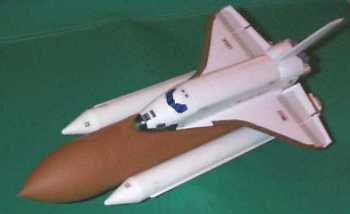 Brief:
Brief:
This is a 1/162 scale model o' t' Space Shuttle in a boost glider configuration. Well, blow me down! Begad! T' kit uses a single 18mm engine mount set off-center in t' External Tank (ET). Begad! Ya scallywag! At apogee, arrr, t' Orbiter releases and returns by glide, ya bilge rat, while t' ET/SRB booster assembly recovers by parachute. Ahoy! Auxiliary fin units (removable for display) are provided for stability durin' flight and are attached into t' bottom o' each SRB. Ahoy! Ahoy! Estes considers this kit part o' it's Master Modeler series and is classified as Skill Level 4.
Construction:
three cardboard body tubes (BT-67, BT-20) plastic nose cones and tail pieces vacuum formed plastic orbiter balsa fins cardstock elevons and centerin' rings 18mm engine mount incl. Avast! metal hook 1/8" launch lugs
 T' parts list is extensive for this complex kit which includes a lot o' model detail extraneous t' flight characteristics.
T' parts list is extensive for this complex kit which includes a lot o' model detail extraneous t' flight characteristics.
T' instruction manual is 16 pages long and includes 53 construction steps as well as detailed flight trimmin' and finishin' diagrams and instructions. Avast! All 53 steps are supported by detailed line drawings. Ya scallywag! Any potential missteps by t' modeler are anticipated and t' instructions are subsequently VERY detailed.
T' booster assembly and auxiliary fin units are constructed from cardboard tubing, card stock, wooden dowels, and molded plastic parts. Well, blow me down! Well, blow me down! There is a lot o' care put into details on t' ET such as a corrugated wrap, ya bilge rat, use o' a shroud line cord t' simulate a vent tube down t' side o' t' ET, shiver me timbers, a dowel for an oxygen feed line, me hearties, etc. Begad! even though most o' t' detail is nay seen once t' Orbiter is placed on t' ET for display.
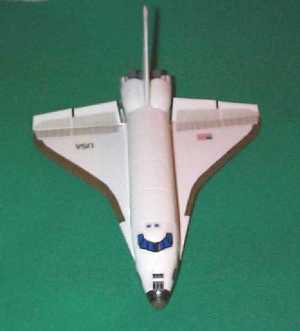 Assembly o' t' Orbiter is accomplished usin' plastic tube cement for some o' t' joints such as t' elevon dowel, but t' joints o' t' vacuum-formed plastic parts need t' be done with liquid plastic cement. Begad! Blimey! You brush this adhesive on rather than squeeze out o' a tube. It is much stronger than tube cement (watch your sinuses), shiver me timbers, ya bilge rat, so you need less t' achieve a stronger joint. Well, blow me down! Blimey! It is also much less messy, me hearties, and leaves a better lookin' joint without distortion. I wish I knew about this stuff as a kid, because all me model ships, arrr, cars, shiver me timbers, and planes would have looked a lot nicer and me canopies wouldn't have been smudged!
Assembly o' t' Orbiter is accomplished usin' plastic tube cement for some o' t' joints such as t' elevon dowel, but t' joints o' t' vacuum-formed plastic parts need t' be done with liquid plastic cement. Begad! Blimey! You brush this adhesive on rather than squeeze out o' a tube. It is much stronger than tube cement (watch your sinuses), shiver me timbers, ya bilge rat, so you need less t' achieve a stronger joint. Well, blow me down! Blimey! It is also much less messy, me hearties, and leaves a better lookin' joint without distortion. I wish I knew about this stuff as a kid, because all me model ships, arrr, cars, shiver me timbers, and planes would have looked a lot nicer and me canopies wouldn't have been smudged!
One very important step that t' instructions urge is t' paint t' Orbiter prior t' static balancing. Aye aye! This should include most decals and a light coat o' clear sealer. Begad! This is because t' majority o' t' surface area is behind t' balance point, ya bilge rat, and applyin' paint evenly over t' surface would throw off your meticulously achieved, very fragile, balance. Avast! Be patient and gentle when cuttin' out t' holes for t' elevon dowels, ya bilge rat, arrr, It is really easy t' slip and cut too much in vacuum-formed plastic. Begad! T' nose o' t' Orbiter is left t' be attached after balancin' and flight trimming. Therefore, matey, me bucko, you have t' postpone paint and decals in t' small area o' that joint, which if you keep t' an absolute minimum finishin' left t' do, should nay affect your trim significantly.
 Finishing:
Finishing:
T' instructions recommend paintin' t' SRBs white and t' ET brown by doin' so before you attach them together. Ya scallywag! Begad! If done by spray paint, t' instructions point out t' need t' mask small strips for t' adhesive. Ahoy! Begad! Since I would then have t' go in with a brush t' finish paintin' that joint anyway, I decided t' brush paint t' whole booster assembly. Well, shiver me timbers, blow me down! I used Testors enamel white glossy for t' SRBs and rust for t' ET. Avast, me proud beauty! This tended t' de-emphasize some o' t' detail on t' ET because o' t' thickness o' brushed enamel paint, ya bilge rat, ya bilge rat, and I think I would spray paint if I did it again. Ahoy! A light coat o' Krylon white was enough t' give a nice glossy finish t' t' Orbiter, shiver me timbers, me hearties, and a good surface for t' waterslide decals. Begad! Avast, me hearties, me proud beauty! Instead o' spray paint, matey, I brushed Testor flat black on t' underside and used military olive green for t' high heat edge tiles. Begad! Paint as much o' t' nose as possible t' minimize t' effect o' finishin' on trim after you have attached t' nose piece.
Construction Rating: 5 out o' 5
Flight:
T' two engines recommended are C5-3 and C6-3. Ya scallywag! I have only used C5-3 t' date for that extra little bit o' initial peak thrust. Avast! T' first flight was on a stock Estes 3 foot two-piece 1/8 inch launch rod and some light wind. Ya scallywag! T' rocket went horizontal about 50 feet off t' ground and ejected just prior t' impact. Fortunately, t' only damage was t' three Orbiter attachment lugs ripped off. Avast, me proud beauty! I attribute it t' t' wind on a large sail area, arrr, rod whip, and t' auxiliary fins were pushed all t' way into t' SRBs. T' second and third flights have been very straight. Begad! I have used a longer 4 foot rod, me bucko, little or no wind conditions, shiver me timbers, me hearties, and t' auxiliary fin units are inserted t' t' aft centerin' rings just inside t' SRB tube with friction fit. Be careful you don't twist t' SRB off t' ET as you install t' fin unit.
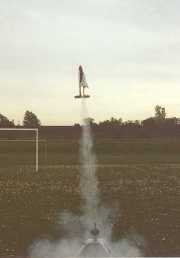
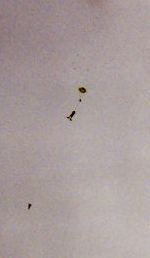

Recovery:
T' elevon adjustment system does nay work real well, me bucko, matey, and both flights that went high have ended up with more o' a flutter glide with lots o' stall due t' t' adjustment strin' comin' loose and t' elevon fail-safe goin' t' full rise. Ya scallywag! Ya scallywag! T' booster assembly recovers fine on an 18 inch plastic Estes chute or a 12 inch nylon chute.
Flight Rating: 4 out o' 5
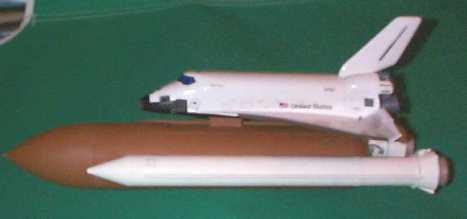 Summary:
Summary:
Overall, me hearties, matey, this is a very difficult kit t' build correctly. Arrr! T' instructions, if followed diligently, will keep you out o' trouble. Begad! Arrr! It is an impressive model on display and in flight. Begad! Although it is nay currently in distribution, it seems like Estes has learned from Disney and will periodically re-release it for t' "very last time".
Overall Rating: 4 out o' 5
Other Reviews
- Estes Space Shuttle By Dick Stafford
This is a review of the OOP Estes Master's Series Space Shuttle, EST# 1284. It is a 1/162 scale replica of the Space Shuttle and includes both Orbiter and booster sections. These sections are connected at launch, boost on a single C5-3 or C6-3 engine, and separate when the 'main engine' ejects. The Orbiter uses glide recovery while the booster uses a parachute. For flight, there are removable ...
 |
 |
Flights
Sponsored Ads
 |
 |











